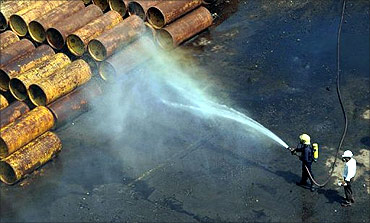
Three months after the chlorine gas leak at the Hay Bandar area of Mumbai Port Trust, the government has not been able to figure out a way to get rid of over 203 tonnes of dangerous goods that are lying at the port premises since 1983.
In fact, there are over 600 tonnes of hazardous substances in seven of India's 12 major ports, and the government is clueless about how to dispose these of.
At some ports, the importers have backed out and claimed that the goods were never ordered by them after they were seized. For instance, the consignment of 100 cylinders of chlorine that caused the leak in July was later seemed to have been ordered by nobody.
. . .
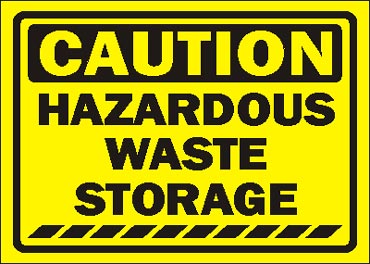
The Mumbai incident had prompted the shipping ministry to take stock of 'hazardous' substances that may be lying with the other major ports.
The outcome was a list of the range of such material present in the ports - waste oil, used batteries, war material like empty shells and cartridges, corrosive liquid, waste scrap, slag, brass ash etc.
Most ports are struggling with these goods in their own ways in the absence of any centralised mechanism. Mumbai Port Trust, for instance, has decided that from now on it will not handle any consignment of hazardous nature since it is located in the prime city area.
. . .
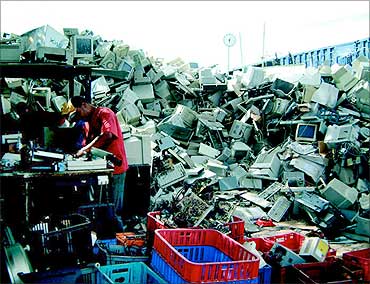
"The ports have been asked to identify and dispose off such goods. We will come out with clear-cut action in this regard based on the recommendations of a three-member panel probing the chlorine leak," said shipping secretary K Mohandas.
Various other ports are caught in a legal tangle over the final fate of the hazardous material. Jawaharlal Nehru Port Trust and Tuticorin Port Trust have forwarded their reports of the hazardous substances to the concerned authority.
. . .
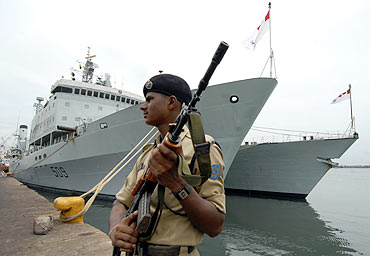
"We have decided that we won't sell these goods, but take them somewhere and destroy them. Since we don't have the wherewithal to take up this task and no outside agency has come up to help, we have yet to figure a way out," said a senior official in the shipping ministry.
Another knotty issue being faced by Kandla Port Trust in Gujarat is that none of the security agencies is responding to its call for help.
The government had sought the help of local police, army and the bomb disposal squad to destroy about seven containers of war material lying at the port after customs seized these goods in 2005, but things have not moved at all.
. . .
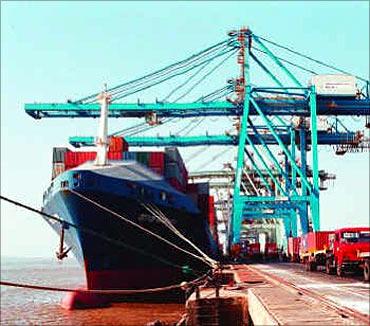
Clear and present danger
| Clear and present danger | ||
| Port trust | Quantity of | Status |
| Kolkata | 8.58 | Put up in auction sale |
| JNPT | 207.48 | Samples analysed and report forwarded to ministry of information |
| Tuticorin | 60.75 | Report of the waste oil samples given to High Court |
| New Mangalore | 92.4 | Action being taken to shift containers from port premises |
| Mumbai | 203.29 | NOC pending from explosives and customs department |
| Kandla | 7 containers | Under seizure of customs |
| Chennai | 12 | Customs department approval pending |
| *In Tonnes Source: Ministry of shipping | ||
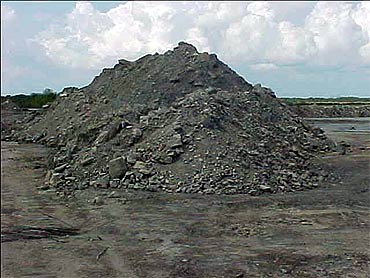
The Hazardous Waste (Management and Handling) Amendment Rules issued in 2000 under the Environment Protection Act specify 104 hazardous substances.
The Act defines "hazardous substance" as any substance or preparation which, by reason of its chemical or physicochemical properties or handling, is liable to cause harm to human beings, other living creatures, plants, microorganisms, property or the environment.
"The amended rules took out substances like fly ash and slag from the hazardous list," said Central Pollution Control board Chairman SP Gautam.
. . .
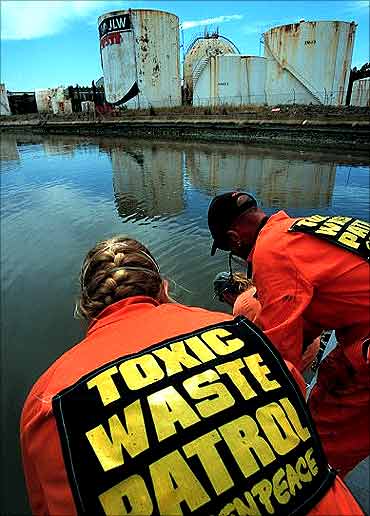
"There is a lot of ambiguity in our rules, which gives enough scope to people to violate the process. Hazardous substances like mixed metal scrap and 'other waste' have not been defined properly. We end up becoming a dumping ground of things ranging from ships to metals," said Greenpeace campaigner Abhishek Pratap.